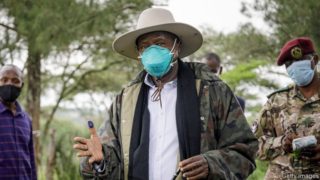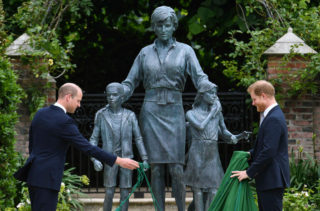The shootings and intimidation began months before the vote
AFTER ONE of the most violent election campaigns in Ugandan history, the result was a foregone conclusion. On January 16th, two days after polls closed, the Electoral Commission declared that Yoweri Museveni of the National Resistance Movement (NRM) had been elected president—yet again—with 59% of the vote. It is the sixth time Mr Museveni (pictured, after casting his ballot) has won at the polls, at least according to the official count, since fighting his way to power in 1986. Although his share of the vote fell slightly, he was still comfortably ahead of his nearest challenger, Robert Kyagulanyi, a pop star and politician better known as Bobi Wine, who drew 35%.
As results were coming in, Mr Wine, while claiming victory, complained of “the worst rigging this country has ever experienced”. One of his organisers in western Uganda says that at a polling station she visited there was no ballot box for presidential votes. Another activist, limping, claims that soldiers and some locals beat her when she tried to monitor the vote in the central district of Nakaseke. The army’s spokeswoman says she is unaware of the allegation.
Such claims are currently anecdotal and difficult to verify. Reports from journalists around the country suggest that election day itself was largely peaceful, despite a late start at some polling stations and hitches with the biometric voter-identification system. But it is hard to build a full picture because the internet has been shut down since the evening before the vote. Procedural obstacles meant that there were few international observers on the ground. A centre set up by civil-society groups to collect information was raided by police, with 26 arrests. The government’s blocking of internet access across the country has stymied Mr Wine’s attempts to collect results data from polling stations via a mobile-phone application.
“Our struggle is not yet over,” said Mr Wine. “It is only just beginning.” He may decide to challenge the result in court. Judges in Kenya and Malawi have overturned unfair elections in recent years. But those countries were already more democratic than Uganda. To nullify the result, Mr Wine would have to prove not only that there were flaws in the process, but also that they substantially affected the outcome.
The relative quiet on voting day may lull monitors from the African Union into declaring the election free and fair. But that is to overlook how Mr Museveni acted for months in advance to ensure victory. The campaigns, taking place under the shadow of covid-19, were a violent farce. Police smashed into Mr Wine’s car just moments after he handed in his nomination papers in early November, dragging him out and driving him home before he could greet supporters. The same month, he was detained for two days for violating covid-19 rules. When protesters came onto the streets demanding his release, the police shot dead at least 54 people, including innocent bystanders. In another incident, in Jinja district in the east of the country, the security forces fired a bullet through his windscreen; in Kalangala, in central Uganda, almost his entire entourage was arrested. By polling day he cut a lonely figure, driving himself home after voting with just his wife in the passenger seat. He dedicated his vote to Nubian Li, his best friend and musical collaborator, who like many others is behind bars.
The police point out that Mr Wine broke covid-19 rules, such as limits on the size of rallies. But well before the pandemic arrived they were dispersing his political meetings in clouds of tear-gas. Towards the end of his campaign he would appear in a helmet and bulletproof vest for his safety. In doing so he also became a walking metaphor for how Mr Museveni and the NRM have militarised many aspects of life, including elections. Mr Museveni treats opponents as enemies and politics as war. Many Ugandans are grateful for the peace he has brought, but fear what he would do if he were to lose an election.
Yet Mr Museveni’s victory is no guarantee of stability, since Mr Wine may take his grievances onto the street if he feels he cannot get satisfaction in court. He has previously warned that if Mr Museveni does not go peacefully then he will be forced out like Muammar Qaddafi, in Libya, or Omar al-Bashir, in Sudan.
That said, there was little sign of unrest in the hours after the results were declared. “Ugandans have chosen to stay with continuity,” says Don Wanyama, a presidential spokesman. In rural areas, especially, the promise of stability still overrides voters’ other concerns. In Kampala, the capital, the result was greeted with stony-faced disappointment. By styling himself as the “ghetto president” Mr Wine has won a devoted following. He has galvanised young people with the promise of change, and the state is taking no chances. The singer is currently confined to his home, which is surrounded by the security forces. He is unable to leave or receive visitors and has had his phone line cut off. The government initially said the armed men were there to protect him. Later an army spokesman described Mr Wine’s isolation as “a preventative kind of arrangement” to contain the risk of disorder.
Forty years ago another generation of Ugandans tried to change their country. They wanted to “clean out this mess and start a new chapter”, recalls Mugisha Muntu, who ran off to the bush to join Mr Museveni’s rebels a fortnight after sitting his university exams. He later rose to become head of the army. But Mr Museveni’s early followers “misread the strength of the institutions” they built and misunderstood the character of their leader, adds Mr Muntu, who himself stood for president in this election, finishing as an also-ran. Disillusionment with Mr Museveni is growing, but for now he marches on.
By The Economist






Thanks a lot for sharing this with all of us you really know what you are talking about! Bookmarked. Please also visit my web site =). We could have a link exchange contract between us! http://www.piano.m106.com
Thank you for an additional good write-up. Where else could anybody get that kind of information and facts in these a ideal way of writing? I have a presentation subsequent week, and I am to the appear for this kind of facts.
I enjoy you because of your whole effort on this site. Betty really likes managing research and its really simple to grasp why. A number of us hear all of the dynamic manner you give both useful and interesting tactics through the blog and as well as strongly encourage contribution from some others about this subject matter plus our favorite girl is actually discovering a lot of things. Have fun with the rest of the new year. You are always carrying out a really good job.
I am developing a blog and I was thinking of changing the template.I got some ideas from here! Feel free to visit my blog and suggest things!
Excellent tips you could have right here. Wish to check out far more of this sometime soon. In the meantime I will check a different webpage within the subject.